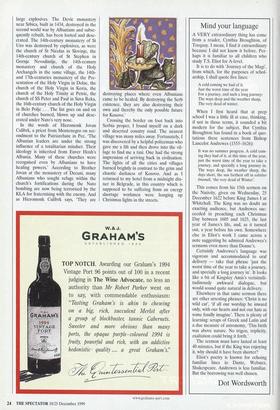Mind your language
A VERY extraordinary thing has come from a reader, Cynthia Broughton, of Torquay. I mean, I find it extraordinary because I did not know it before. Per- haps it is familiar to all children who study T.S. Eliot for A-level.
It is to do with 'Journey of the Magi', from which, for the purposes of schol arship, I shall quote five lines:
A cold coming we had of it, Just the worst time of the year For a journey, and such a long journey: The ways deep and the weather sharp, The very dead of winter.
When I first heard that at prep school I was a little ill at ease, thinking, if not in those terms, it sounded a bit modern for the subject. But Cynthia Broughton has found in a book of quo- tations these sentences from Bishop Lancelot Andrewes (1555-1626):
It was no summer progress. A cold com- ing they had of it, at this time of the year, just the worst time of the year to take a journey, and specially a long journey in. The ways deep, the weather sharp, the days short, the sun farthest off in solstitio brumali, 'the very dead of Winter'.
This comes from his 15th sermon on the Nativity, given on Wednesday, 25 December 1622 before King James I at Whitehall. The King was no doubt an exacting audience, but Andrewes suc- ceeded in preaching each Christmas Day between 1605 and 1625, the last year of James's life, and, as it turned out, a year before his own. Somewhere else in Eliot's work I came across a note suggesting he admired Andrewes's sermons even more than Donne's.
Certainly Andrewes's language was vigorous and accommodated to oral delivery — take that phrase 'just the worst time of the year to take a journey, and specially a long journey in'. It looks like a bit of Kingsley Anus's verisimili- tudinously awkward dialogue, but would sound quite natural in delivery.
Elsewhere in that same sermon there are other arresting phrases: 'Christ is no wild cat', 'if all our worship be inward only, with our hearts and not our hats as some fondly imagine'. There is plenty of learning: scraps of Greek and Latin and a due measure of astronomy, 'This birth was above nature. No trigon, triplicity, exaltation could bring it forth.'
The sermon must have lasted at least 40 minutes, but if the King was enjoying it, why should it have been shorter?
Eliot's poetry is known for echoing familiar lines in Dante, Webster, Shakespeare. Andrewes is less familiar. But the borrowing was well chosen.
Dot Wordsworth






















































































































 Previous page
Previous page